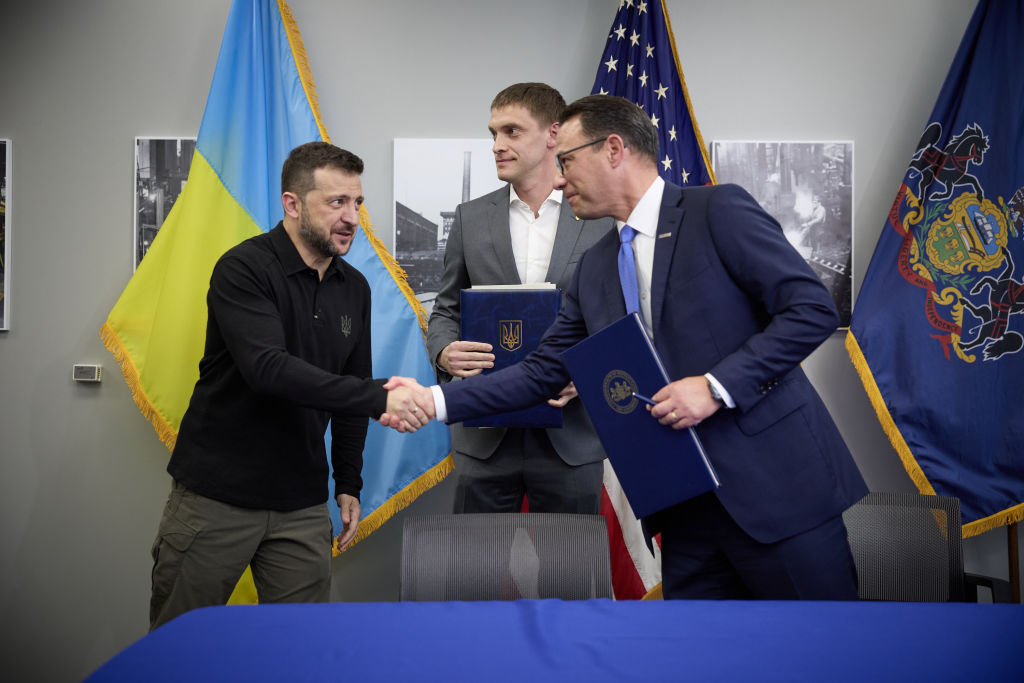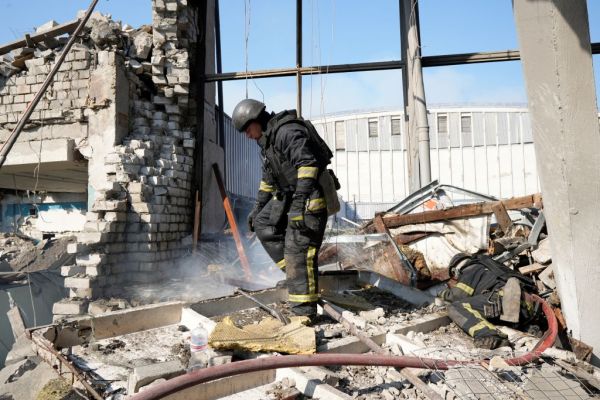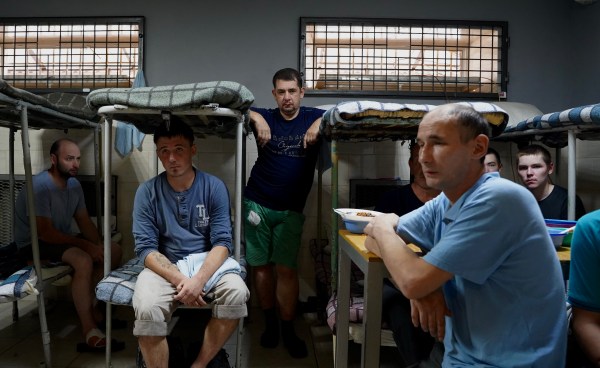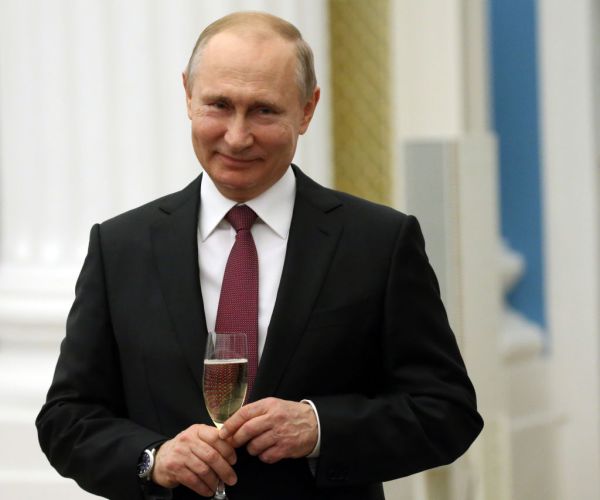I’m trying to think of a modern precedent for a foreign leader who’s sufficiently well-known and well-liked here that having him show up in a battleground state in the thick of a U.S. election might move the needle with voters. But I’m stumped.
Not having to know or care who’s in charge of other countries is a privilege of being an American, of which most of us take full advantage. And insofar as we do know and care, it’s because certain leaders have distinguished themselves as unusually diabolical Bond villains. Vladimir Putin, Xi Jinping, Ali Khamenei, Kim Jong Un—none of the world’s baddest bad guys would be warmly welcomed in Pennsylvania.
The best I can do by way of naming a foreign head of state whose endorsement might help one presidential candidate or another is the prime minister of Israel, but the Israeli government takes care not to align itself too closely with either of America’s major parties. I remember vividly, for instance, when Donald Trump put Benjamin Netanyahu on the spot in the final weeks of the 2020 campaign and urged him to admit that Joe Biden never could have brokered a deal like the Abraham Accords.
Bibi wouldn’t bite, though. Israel works hard to maintain good relations with Democratic leaders knowing that it can’t afford to lose U.S. support for four years at a time depending upon who’s in charge of the White House.
The same goes for every other American ally, especially those menaced by one of the aforementioned Bond villains. It’s the height of foolishness for any foreign leader to take sides in a U.S. election given that their endorsement almost certainly won’t move votes and will certainly earn them a grudge among the other party.
But there might be one exception.
Volodymyr Zelensky is in the United States this week to attend the U.N. General Assembly. He plans to meet with Joe Biden and Kamala Harris and to speak with Donald Trump at some point to explain his plan to end the war with Russia, all of which is fine and proper. On Sunday, though, he detoured away from New York and Washington to make a goodwill visit to a munitions factory in … Pennsylvania, the state that will probably decide the presidency.
He arrived on a U.S. military plane and toured the facility with Gov. Josh Shapiro and Sen. Bob Casey, both Democrats and key players in this fall’s election. Casey is locked in a dogfight with Republican Dave McCormick for a Senate seat; Shapiro is Harris’ most influential surrogate in America’s most important swing state. The governor wasn’t coy about the electoral implications of the visit, either. “Pennsylvania is home to the second largest Ukrainian-American population of any state in the nation,” he reminded his followers on Twitter alongside a highlight reel of Zelensky’s tour.
Republicans were unhappy. “The idea that you bring in Zelensky to a battleground state in the heat of an election cycle is un-American,” Missouri Sen. Eric Schmitt groused.
The mood worsened when the Ukrainian president’s new interview with The New Yorker circulated and featured him jabbing at Trump’s running mate. “He is too radical,” Zelensky declared of J.D. Vance, condemning the “dangerous signals” sent by Vance’s demand for Ukrainian territorial concessions and urging him to read up on World War II to find out what happens when madmen with dreams of empire are appeased.
At no point did he formally endorse Harris over Trump, but between the interview and his visit to the factory in Scranton (Joe Biden’s hometown!) it wasn’t hard to discern a Ukrainian rooting interest in this election.
That visit shouldn’t have happened. It was a mistake for Zelensky and for his Democratic patrons to have been party to it. Although in both cases, you can understand how it was rationalized as a necessary evil to neutralize a fascist threat.
Foreign interference.
Harris and Zelensky will claim that sometimes a cigar is just a cigar, that visiting an American factory where weapons are being made for Ukraine is nothing more than an opportunity to say thanks. But that’s transparent nonsense in her case and barely veiled nonsense in his.
To begin with, it isn’t just the Ukrainian American population in Pennsylvania that stands to punch above its weight on Election Day. As Harris noted during her debate with Trump, there are a lot of Polish Americans spread across the key Midwestern battlegrounds—roughly 2 million among Pennsylvania, Michigan, and Wisconsin.
Biden beat Trump by a combined 250,000 or so votes in those three states in 2020.
“I think that’s the concern of everybody—if Ukraine goes down, then Poland goes next, and that’s very concerning,” one Polish American voter recently told the Associated Press. Having the scourge of Russian imperialism drop by Scranton while he was in the U.S. was an ideal way to refocus voters of Polish and Ukrainian ancestry on the foreign policy consequences of a Trump victory.
And Zelensky had good reason to make the trip.
The Ukrainians are frustrated that the White House is still dragging its feet on authorizing strikes deep inside Russian territory, the Washington Post reported on Tuesday. Ukraine wants to use long-range U.S. missiles to hit airfields and disable Russia’s aerial terror campaign against Ukrainian cities. Some European nations are for it, as are elements of Biden’s own administration, but there’s a split inside the White House driven by fear of escalation with Moscow. Zelensky is preparing to pitch Biden in person later this week to authorize use of the missiles. It’s that important to him and his military effort.
Go figure that he might opt to butter up the White House ahead of time by visiting America’s most influential swing state with Pennsylvania’s two highest-ranking Democrats in tow.
Insofar as Team Harris had any input on the trip, there might be another reason they would want Zelensky out on the trail. The recent debate demonstrated lavishly that Democrats know how to get in Trump’s head and bait him into making foolish mistakes. Ukraine’s president touring a battleground state was destined to do that, and Trump’s big mouth is bigger than usual when he’s unsettled.
So maybe Zelensky’s trip was bait. The Harris campaign might have gambled that seeing him in Pennsylvania would irritate Trump and get him to start attacking the Ukrainian president on the trail. If so, it took less than 12 hours for that gamble to pay off.
In isolation, a visit by Zelensky to Pennsylvania might not influence the voting calculus of hawkish Nikki Haley Republicans or voters of Eastern European heritage. But if it leads to Trump being consistently more critical of Ukraine in his public remarks over the next month or so, chronically antagonizing those voters? That’s worth something potentially.
So it’s a win for Democrats and a win for Zelensky, depending on how this week’s White House meeting about the missiles goes. The only downside is … normalizing the idea of foreign leaders putting a thumb on our electoral scales. Granted, Zelensky’s interference wasn’t covert, as Russia’s was in 2016 and as Iran’s is in 2024, but going forward his trip will stand for the proposition that international influence in American campaigns is acceptable so long as it’s “above board” and benefits the right side. “Foreign interference in American elections isn’t only bad when it helps Donald Trump,” National Review’s Dan McLaughlin complained on Monday, justifiably.
And if it turns out that the White House made clear to Zelensky that permission to strike inside Russia might hinge on an appearance in Pennsylvania, that would smell an awful lot like a quid pro quo in which U.S. government support is dangled in exchange for private political benefit. Which presidents have been known to be impeached for, you might recall.
All Democrats can credibly say in response to any of that is this: Do you want to beat the fascists or don’t you?
Yes, fine, they’d insist, sending popular foreign leaders to battleground states to meet prominent Democratic officials is unorthodox and sets a bad precedent, but the return of Trump and his authoritarian project makes this a “Flight 93” election for the American left and its classical liberal allies. If Zelensky’s visit to Pennsylvania ends up being the difference between landing the plane safely and crashing in a fiery heap, you do what you need to do to survive and worry about the civic consequences later.
To save America from the norms-smashers, we might have to smash a few norms. That sounds familiar.
Democrats won’t lose any sleep over a little foreign interference at Trump’s and Putin’s expense, but what about Ukraine? What’s left of the country’s relationship with the GOP after this?
Desperate times, desperate measures.
In fairness, Zelensky was careful to praise Trump—sort of—in the same New Yorker interview in which he criticized Vance.
“My feeling is that Trump doesn’t really know how to stop the war even if he might think he knows how,” he complained at one point. But then he drew a favorable contrast between the Republican nominee and his more ideological running mate: “I should say that it hasn’t been like this with Trump. He and I talked on the phone, and his message was as positive as it could be, from my point of view. ‘I understand,’ ‘I will lend support,’ and so on.”
There will be ass-kissing galore when Zelensky speaks with Trump later this week, I’m sure. And with Trump, a little ass-kissing might go a long way.
But the nationalist vanguard of the right will have a long memory, beginning of course with Vance. If Harris wins this race, Zelensky will be added to populists’ parade of scapegoats who illicitly interfered in the campaign somehow. Perceptions on the right that Ukraine’s government is partly to blame for Trump’s political demise will embitter even some Republicans who despise Russia out of atavistic Reaganite instincts. The frenzy over “globalists” conniving against Real America will turn even more feral.
This, again, is why most foreign leaders don’t dare dip a toe into U.S. electoral politics. The risk that by doing so you’ll make staunch enemies of half the country is too great. So why would Zelensky, who’s no fool, choose to take that risk anyway?
I can only assume that he believes a second Trump administration will surely abandon Ukraine, in which case the best thing he can do for his country right now is—within reason—to nudge Americans to support Democrats.
It’s fair to question that belief given how cautious Trump has been about Ukraine during the campaign. “First, he backed Republican Mike Johnson in the House as Johnson signed onto a Ukraine aid package,” Michael Brendan Dougherty of National Review points out. “Second, Vance, as his running mate, has stuck to the script set by Trump” rather than veering off into “America First” dogmatism. As recently as April, Trump called Ukraine’s existence an “important” U.S. interest. If you take him at face value, there’s no reason to think he’s about to pull the plug on American military support.
But why should we take him at face value? Apart from the subjects of immigration and tariffs, Trump seems willing to say anything about any policy that he thinks might add to his vote total.
The more outlandish his campaign promises become, the clearer it is that he’s running his own version of a “Flight 93” campaign in which any measure to land the plane in one piece is justified. No tax on tips, no tax on overtime, no tax on Social Security, limitless state and local tax deductions from federal income tax, and most recently a cap on credit card interest rates that has economists audibly groaning—all are naked panders for votes aimed at key blocs, not thought-through policies crafted to advance a cogent economic vision. We have no idea which of them, if any, he takes seriously enough to try to enact in a second term and which are pure boob bait designed to get him over the finish line in November.
His scrupulous strategic ambiguity toward Ukraine is of a piece with that. Trump understands that taking a hard Vance-ian line against further funding for Kyiv might spook right-wing hawks and other influential constituencies, like Polish Americans in the Midwest, costing him the election. So he’s followed a “no false moves” approach of talking very vaguely about the urgent need for peace with zero concrete commitments in either direction.
To believe that he might keep the money flowing to Ukraine as president, you need to believe that his second term won’t be that much different from his first. I do not. I think Trump imagines his second term as a chance at last to govern the way he really wants to govern: He’ll focus on expelling foreign people, penalizing foreign goods, persecuting his political enemies, and withdrawing American troops from various theaters overseas so that they’re no longer a thorn in the local Bond villain’s side.
Go figure that Zelensky and his intelligence bureau might have come to the same conclusion. Trump’s ambiguity about Ukraine is a political ploy, they may assume, meant to falsely reassure swing voters that reelecting him won’t necessarily guarantee Russian victory in the war. That’s why Vance has stopped reminding voters that he doesn’t care what happens to Ukraine and why Mike Johnson got behind another military aid package with Trump’s support. No false moves before Election Day!
But once he and Vance are over the finish line in November, all bets are off. The facade will collapse—or so Zelensky and his team might reasonably fear. Does this sound like a man who’s in it for the long haul?
Under these unique circumstances, with the postliberal right poised to govern with the gloves off, a foreign leader might calculate that lending a hand to the Democrats is actually the rational strategic move.
It can’t be a coincidence that Zelensky is pushing a peace plan now, in fact, with Republicans no worse than a 50-50 shot to reclaim power. By having some sort of framework in place to try to bring Russia to the table, the Ukrainians may be hoping to impress upon a future President Trump that they’re the side that’s operating in good faith to try to end the conflict and that he should use his leverage to pressure Moscow to agree.
But I wouldn’t bet $5 on him doing so, let alone the survival of my country, and neither would Zelensky, I suspect. Putin is unlikely to fear that Donald Trump, of all people, will twist his arm too painfully if he drives a hard bargain during negotiations over the war, especially with Vice President Vance burbling in Trump’s ear about “spheres of influence.” If the shooting is to end with meaningful concessions for Ukraine, Kyiv is better off with a Democratic administration in its corner.
Which, I assume, explains how we ended up with Zelensky in Scranton with Josh Shapiro and Bob Casey by his side in the first place. If we’re destined to be a country where one major party is reliably pro-authoritarian, America’s democratic allies will reliably—if subtly—begin taking sides.










Please note that we at The Dispatch hold ourselves, our work, and our commenters to a higher standard than other places on the internet. We welcome comments that foster genuine debate or discussion—including comments critical of us or our work—but responses that include ad hominem attacks on fellow Dispatch members or are intended to stoke fear and anger may be moderated.
With your membership, you only have the ability to comment on The Morning Dispatch articles. Consider upgrading to join the conversation everywhere.